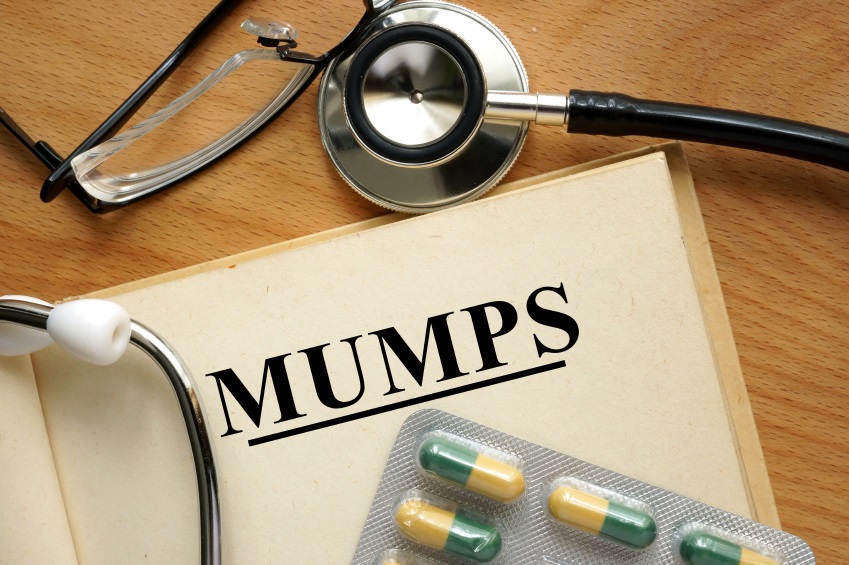Similar to measles, mumps is a contagious disease that is spread when infected people cough, sneeze, and even talk. Mumps remains a common disease in many parts of the world, including regions in Asia, Africa, Europe, and the Pacific—and also in industrialized countries like the UK and Japan which do not routinely vaccinate against the disease. According to the CDC, international travelers (particularly those older than one year) who are not protected against mumps are at risk of infection. Stay safe and informed with this list of answers to commonly asked questions we hear from our travelers, including advice for preventing mumps from our Chief Medical Officer, Dr. Robert Wheeler.

What is mumps, and how is it transmitted?
Mumps is a virus that typically affects the salivary glands. It can be spread through the air or by direct contact. Most frequently, the virus is spread by coughing, sneezing, talking, sharing items like water glasses or eating utensils and touching surfaces without washing hands first.
When will symptoms appear?
It is standard for symptoms to appear anytime in the first two to three weeks following infection. Sometimes, symptoms can appear as early as twelve days or as late as twenty five days after infection.
What are the symptoms of mumps?
- Headache
- Muscle Aches
- Exhaustion
- Fever
- Loss of Appetite
- Swollen Salivary Glands that can cause cheeks and neck to puff outward
Is it possible to be infected and not realize it?
Yes. Some travelers may be infected and either experience mild symptoms or no symptoms at all. Most people make a full recovery from the virus in a few weeks.
Is the virus contagious? If so, for how long?
The virus is extremely contagious to those who have not been vaccinated. Those infected are most contagious a few days prior to symptom onset and about five days after their glands start to swell.
Who is at risk?
Anyone who has not received the mumps vaccine is at risk. Some people may also be at risk if they received the vaccine, but did not develop an immunity to the disease.
Can mumps be prevented?
With the MMR (measles-mumps-rubella) vaccine, most cases of mumps can be prevented. Receiving two doses of the vaccine is 88% effective at preventing mumps and receiving one dose is 78% effective. Most children receive their first dose between twelve and fifteen months, followed by a second dose between the ages of four and six. Adults who have not yet received the MMR vaccine may receive the vaccine at any time.
Note: If you were born before 1957, you are immune to measles and do not require a vaccine.
Can the mumps be treated or cured?
When diagnosed with mumps, the best thing a person can do is rest. They may be prescribed medication to reduce their fever, but rest and fluid consumption are the best treatments until the virus has passed.
Can complications arise from the mumps?
Complications are rare, but are more likely to occur in adults. The most common complication is inflammation. Inflammation of the brain, tissue covering the spinal cord, ovaries (in females) and testicles (in males).
How much does the vaccine cost?
Routine vaccines should be covered by most insurances plans, but always check with your insurance provider before scheduling an appointment. If you do not have insurance or if vaccinations are not covered, help is available.
Are there any side effects to the vaccine?
There is a risk of side effects with any vaccine. Common side effects are fever, rash and swelling at the injection site. Severe complications are unlikely, and the CDC advises that it safer to receive the vaccine than risk suffering from a case of mumps.
How can I protect myself from getting the mumps while traveling?
According to Dr. Wheeler, planning ahead is key! Speak with your doctor or travel medicine specialist regarding your travel plans prior to your trip. If you haven’t received the vaccination, it’s important to remember that this vaccine requires two doses and they must be separated by 28 days. Practice good hygiene by washing hands often, covering your mouth when sneezing and avoiding contact with anyone who is sick. For more information on the vaccine and what you need to do to before your trip, visit the WHO’s website or the CDC’s website.
If you begin to feel seriously ill while you’re traveling (especially if you have a fever), it’s important to seek medical care as soon as possible. Our clients have access to worldwide medical referrals and our nurse helpline 24 hours a day, 365 days a year.
Safe Travels!


